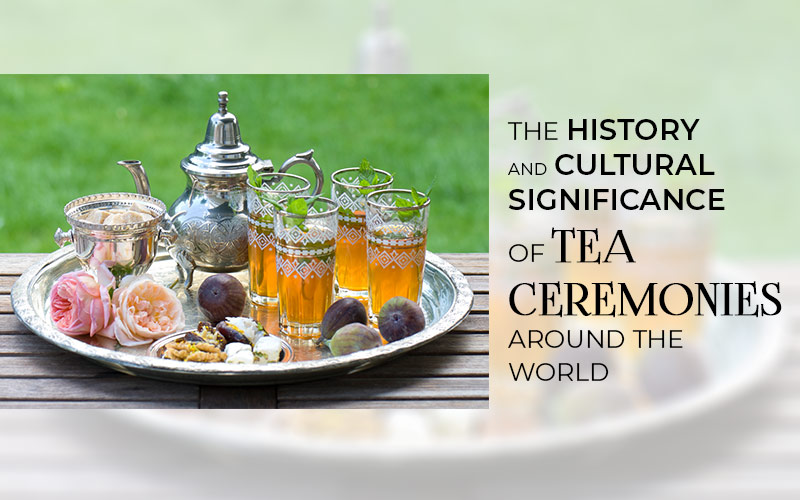
The History and Cultural Significance of Tea Ceremonies Around the World
Tea
ceremonies are a unique way for people to come together and connect over a
shared love of tea, but they also carry deep cultural significance. In many
cultures, the tea ceremony is seen as a way to demonstrate hospitality,
respect, and gratitude, and it is often performed for guests or as part of
special occasions or celebrations. Tea ceremonies have a long and rich history,
with different cultures around the world having their unique take on the
practice. Here are some interesting facts and information about tea ceremonies
and their cultural significance:
Japan: In Japan, the Way of Tea is
considered a fine art that requires years of study and practice to master. The
Japanese tea ceremony, also known as the ‘Way of Tea’ or Chanoyu, is a cultural
tradition that dates back to the 12th century. It is an elaborate and precise
ritual that involves the preparation and serving of matcha, a powdered green
tea. The ceremony is often performed in a specially designed tea room called a
Chashitsu, and it emphasizes the principles of harmony, respect, purity, and
tranquility.
China: Tea is an integral part of
Chinese culture, with tea ceremonies having a long history that dates back to
the Tang dynasty (618-907 AD). The traditional Chinese tea ceremony involves
the brewing and serving of loose-leaf tea in small cups or bowls. The ceremony
is often performed for guests as a sign of hospitality and respect.
India: Tea has been a popular
beverage in India for centuries, and the country has a rich tea culture that is
heavily influenced by British colonialism. The Indian tea ceremony, also known
as Chai Tea, is a simple and informal affair that involves boiling tea leaves,
water, and milk together with a blend of spices, such as cinnamon, ginger, and
cardamom, etc.
Morocco: In Morocco, tea is a symbol
of hospitality and is often served to guests as a sign of respect. The Moroccan
tea ceremony involves brewing green tea with mint and sugar in a traditional
teapot called a berrad, and it is often served with sweet pastries or nuts.
Russia: Tea has been a popular
beverage in Russia since the 17th century, and the Russian tea ceremony is a
formal and elaborate affair that involves brewing tea in a samovar, a
traditional metal urn. The tea is often served with lemon, sugar, and a variety
of sweet and savory pastries.
England: Tea is an integral part of
British culture and is often referred to as the "British cuppa." The
traditional English tea ceremony involves brewing black tea in a teapot and
serving it with milk and sugar. The tea is often accompanied by sandwiches or
sweet treats, and it is usually consumed in the late afternoon as a break
between lunch and dinner.
Turkey: In Turkey, tea is an
important part of daily life and is often served in small tulip-shaped glasses.
The traditional Turkish tea ceremony involves boiling black tea leaves in a
double teapot called a çaydanlık and serving the tea with sugar cubes. Tea is
often enjoyed with friends or family members, and it is a popular beverage
throughout the country.
Iran: Tea is a popular beverage in
Iran and is often served in small glasses with sugar cubes or rock candy. The
traditional Iranian tea ceremony involves brewing black tea in a samovar and serving
it with dates, raisins, or other dried fruits. Tea is often enjoyed during
social gatherings or as part of a traditional meal.
Tibet: In Tibet, tea is a central
part of daily life and is often served with yak butter and salt. The
traditional Tibetan tea ceremony involves brewing tea in a large pot and adding
butter, salt, and sometimes spices like ginger or cardamom. The tea is then
churned and served in small bowls, and it is often consumed in the morning as a
way to start the day.
In
conclusion, tea-drinking traditions vary greatly from country to country, and
each culture has its unique take on the practice. Whether you prefer a formal
and elaborate ceremony or a more casual and relaxed affair, the act of sharing
tea with others can be a meaningful and rewarding experience that brings people
together and helps to forge lasting bonds.
Disclaimer: The opinions expressed in this article are those of the author's. They do not purport to reflect the opinions or views of The Critical Script or its editor.

Newsletter!!!
Subscribe to our weekly Newsletter and stay tuned.

















Related Comments